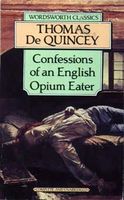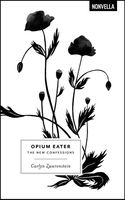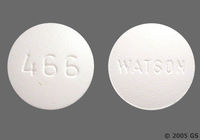Writing Through Pain
By Koom Kankesan
Carlyn Zwarenstein, in Opium Eater: The New Confessions, fuses memoir, reflective inquiry, cultural journalism, and literary investigation to look at opiates and what they have done for her. She is a writer and mother living with ankylosing spondylitis, a form of inflammatory arthritis. Her book sprawls and touches on personal experience as well as the history, chemistry, and culture of opiates. She focuses on their ability to alleviate mental stress. Zwarenstein describes how pain and difficulty become bearable once the subject knows that a few hours hence, relief will come. In touching and personal terms, she affirms that the purpose of literary life must be more than simply to endure.
Various figures pop up in Zwarenstein's book. The grandest and most recurring is the British Romantic Thomas De Quincey. That great peripatetic and laudanum enthusiast, lounging a couple of rungs below Wordsworth & Coleridge, apparently owned a bath tub in which he dumped various manuscripts in the process of completion. The story goes that De Quincey would dip his hand in, pull out some treatise or manuscript, and attempt working on it. I did not understand De Quincey's penchant for laudanum when I read his book in undergrad, but I couldn't help liking him. Having suffered injuries later in life (and once heavily opiated for a couple of months), I now see what he saw in the anaesthetic ambrosia. Booze is fine - I can take it or leave it. Liquor is dandy but I sometimes prefer candy! The few times I've tried weed, Maryjane has done nothing for me. But opiates - there is a kismet in my body chemistry that simply responds. I no longer take them - it is too easy to become dependent and addicted - but I know the allure. It is a surprise more writers have not written about them.
Koom: Your timely 'non-vella', Opium Eater: The New Confessions, is a personal memoir about your use of the opiate Tramadol and its ability not only to relieve pain but also to give you spaces of increased calm, clarity, and flow. I found it fascinating because there have been times when I've been prescribed painkillers and they've had a similar effect on my mood, although I've never been able to write creatively while on them. Your writing embodies a fascination with opiates and their use. What reactions or feedback have you gotten to the book?
Carlyn: I was really anxious with each person I showed the book but most reactions have been empathetic about the pain and curious about the drugs. When excerpts of the book, which of course lack context, were published on The Tyee and vice.com, I got a range of different reactions. Although some pain patients share my experience, others were very upset at the way I've romanticized it in a way that is very much not their experience, and which might result in further stigma to people who depend on these medicines to work, raise children, manage their condition through exercise, and contribute to society. Of course, the section for Vice in particular was chosen for its more sensational content, which I believe is put in context by the rest of the book, in which I go into the reasons why someone might be driven to seek meaning in their experience of pain and of treatment.
I was also called a junkie, self-deluding, exaggerating, and an addict. One reader wished me the best of luck with what's left of my life, which I know really was meant well. The range of responses I think reflects both which particular bit of the book they read (I think it's best for people to get the whole thing, as I've tried to present an accurately complex and individual picture), and the misinformation that exists around the distinctions between dependency, addiction, and related issues.
Koom: I think you did a very good job of covering various facets of your topic in the book. I can attest for sure that your feelings were not just a romantic affectation. I was amazed the first time I took painkillers - not only did they address the physical pain I was coping with, they very literally put me in a philosophical, calm state of equanimity that was unlike anything I'd ever experienced. One thing that really struck me about your book was your ability to zero in on different kinds of pain we struggle with as writers. I feel that this is rarely grappled with in discussion about the writing process. Can I get you to speak towards the issue of pain as an obstacle, all kinds of pain, in life and in writing?
Your CanLit News
Subscribe to Open Book’s newsletter to get local book events, literary content, writing tips, and more in your inbox
Carlyn: I don't know. Physical pain is obviously an obstacle to anything. I tried to convey in the book just how much it can make it difficult to live a normal life, especially when, as in my case, you are at a stage of life where there are many responsibilities and you have many aspirations that require energy and physical capability. I can't just stay in bed all day or soak in a hot bath all day long, which would be really great. Writing is not the worst activity, but still, it's physically demanding too in that it requires energy, repetitive motion, and sitting--which is the second most difficult thing for me, after standing in one place, which is Philip Roth's solution to persistent back pain but obviously not mine. I don't actually think that pain is a terrible obstacle to writing, but an inflammatory disease like mine is really hard on one's energy and stamina, and just fitting it in is difficult when ordinary life activities take a long time and are draining. By contrast, I don't think that emotional pain needs to be an obstacle to writing. It can be a fuel.
Though I wouldn't equate depression, which can be deadening and bad for writing, with emotional pain.
Koom: I knew that Roth wrote standing up but I didn't know that was due to back pain. A couple of years ago, I suffered from a herniated disc that caused nerve damage in my shoulder and right arm. It was very painful. I was on a regimen of constant painkillers for two or three months but I weaned myself off them as I did physiotherapy as the herniation slowly retracted - I was cognizant of the possibility of addiction as I'd started to build a tolerance. Now, that problem is better but I'm left with the nerve damage in my shoulder and arm which can be quite painful and restrict mobility. I can no longer write for four to six hours a day as I once did. In fact, I'm sure my practice of doing that is what caused the herniation in my neck in the first place. So the irony is that as my confidence as a writer grows (as does hopefully my ability), my ability to physically perform the activity has diminished. There is something about using the pain as you say. I have always used my emotional and psychological pain to anchor and motivate me to write in the past but now I wonder if I can detach myself from the physical pain somewhat, use it to ground and motivate/maneuver me through writing? Pain does have a particular taste and feel - it's got an edge that cuts through things.
Carlyn: That's a cool way of describing one kind of pain.
Koom: Yes... I guess I'm asking how you see yourself using your own pain to push yourself to write?
Carlyn: I don't. I mean, in this book, I spent a lot of time trying to work with physical pain in order to use it as the subject of the essay. But I wouldn't want that to be my eternal subject--so it's more of a barrier to overcome, going forward.
But, yes, you can meditate or focus very specifically on pain that is acute enough. Not a very good use of one's limited time on earth though.
Koom: Right. We were talking briefly about how you've made a trade off vis a vis pain/relationships/writing. Do you wish to talk about that or anything else before we wrap up our mini-interview?
Carlyn: I don't know that I'd want to say anything final on that point--just that it's hard to manage everything, and there are enough relationships of different kinds in my life that at the moment, I'm kind of following Virginia Woolf--"a woman must have money and a room of her own if she is to write fiction"--and since fiction is what I'm working on now, I'd sacrifice most things to have the time and independence to pursue it. So that's the relationship/pain/writing bit. For the rest, I guess I'd like to say that what I've tried to do in Opium Eater: The New Confessions is to give readers a visceral experience of a whole range of places we can look for both meaning and intensity in challenging (or any) lives: various types of love, friendship, work, art, mindfulness, exercise, literature, intoxication, dreams, and of course pain.
The views expressed in the Writer-in-Residence blogs are those held by the authors and do not necessarily reflect the views of Open Book.
Koom Kankesan was born in Sri Lanka. While his family lived abroad, the civil war in Sri Lanka broke out and this caused them to seek a new home. They eventually settled in Canada and have lived here since the late eighties. He has a background in English Literature and Film Studies. Koom contributed arts journalism to various publications before becoming a high school teacher in the Toronto District School Board. Since working as a teacher, he has taken semesters off now and again to work on his fiction. The Tamil Dream, his new book, is his most ambitious to date. It looks at the end of the civil war in Sri Lanka and how it affected Tamils here in Canada. Besides literature and film, Koom has deep interests in history and science, and an enduring love for comic books.
You can write to Koom throughout January at writer@open-book.ca.





